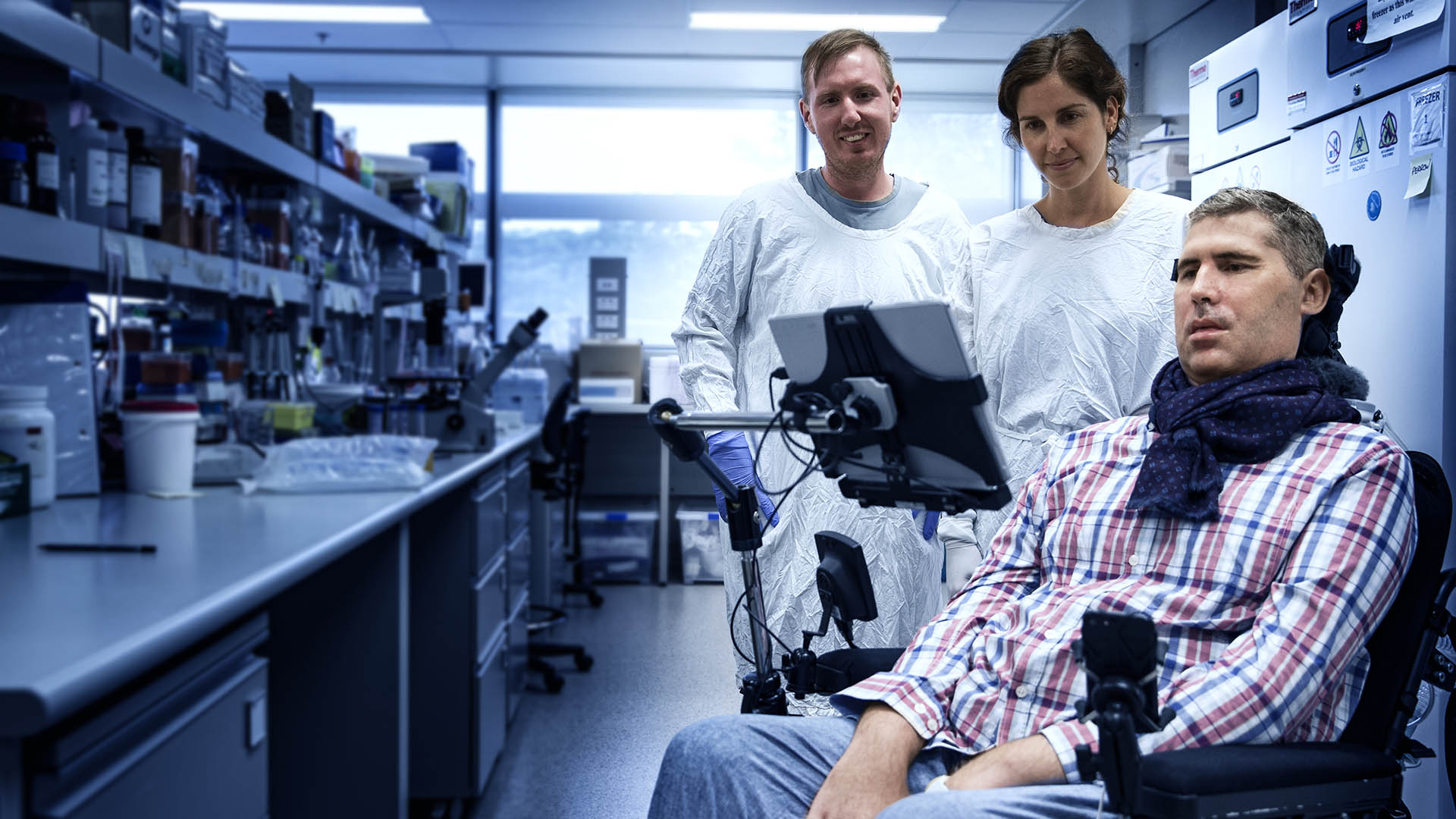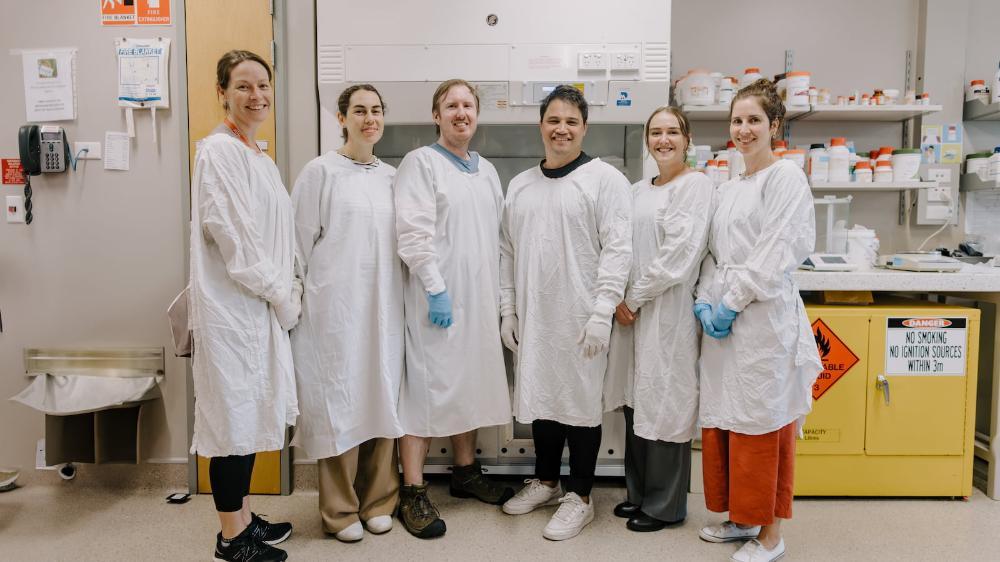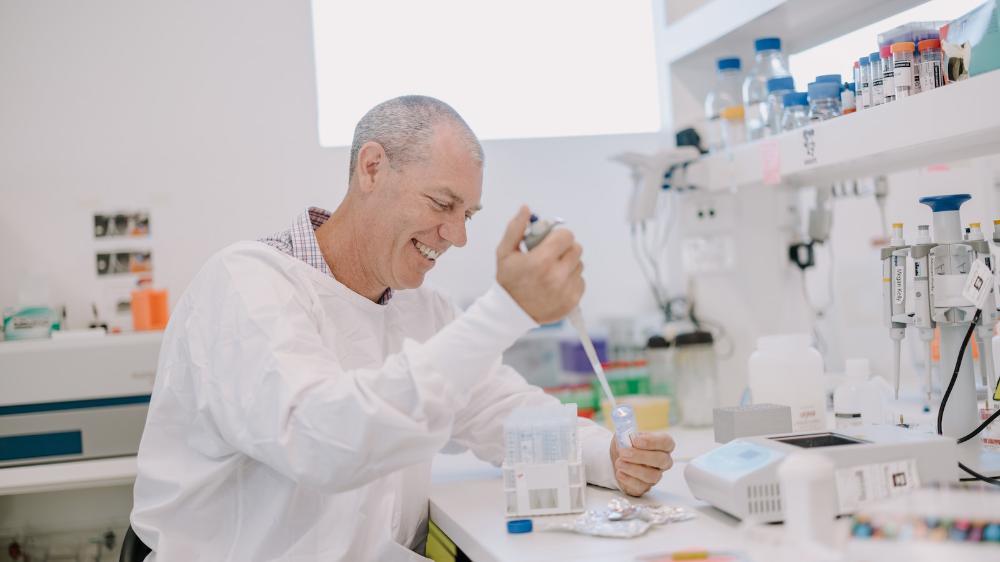A legacy of hope
Remarkable researchers forge ahead in their tireless pursuit to fight MND
May 16, 2025
When Professor Justin Yerbury AM passed away in 2023, of the very disease to which he devoted his life’s work, he left an indelible imprint on every aspect of research into the devastating condition.
Be it through his research breakthroughs, which have made remarkable inroads into therapeutic treatments for motor neurone disease; his mentorship of young and passionate researchers, who continue to work tirelessly in pursuit of a cure; and the colleagues he inspired to work with him to try and understand the molecular basis for the disease.
Now, two years later, the researchers who comprise the University of ÌìÃÀ´«Ã½’s (UOW) Yerbury Lab have embraced their shared sense of duty to carry on with Professor Yerbury’s groundbreaking work into Motor Neurone Disease (MND).
, a close colleague of who took over as a mentor of the Yerbury Lab, based in UOW’s Molecular Horizons, said the team are building on Professor Yerbury’s legacy while, at the same time, forging their own research paths.
“Justin’s team is simply amazing. Despite the extraordinary challenges they have faced together, they continue to do world-leading research with the passion and drive that Justin inspired in them. It really is a privilege to be able to work with the team”

Each day, two Australians are diagnosed with MND and two lose their lives to it. More than 2000 Australians live with MND, also known as amyotrophic lateral sclerosis, ALS, or Lou Gehrig’s Disease. MND is a global health challenge, touching the lives of more than 400,000 people worldwide.
A progressive, fatal disease that deteriorates the nervous system, MND affects motor neurons, which are nerve cells that relay messages from the brain to the muscle. The clumping together of proteins within these neurons trigger neurodegeneration, impacting muscle function for movement, speech, breathing, and swallowing. According to MND Australia, up to 15 per cent of MND is considered ‘familial’, meaning there is a genetic link to the disease.
For Professor Yerbury, the fight against MND was deeply personal. As a young man, he lost his mother, grandmother and aunt to the disease over a six-week period in 2002, followed by his sister, uncle and cousin. MND was a ticking time bomb, lurking in wait in the DNA of his family tree.
This devastating chain of events inspired Professor Yerbury to leave his career in professional basketball at the Illawarra Hawks and return to UOW, where he completed a Bachelor of Science followed by a PhD. He was in a race against time to discover a treatment for the cruel disease that was wreaking havoc on his family.
Professor Yerbury, who became an esteemed molecular biologist, established his own lab at UOW, focused on understanding the cellular process that prevents proteins from forming the clumps that are the hallmark of degenerative diseases.
In 2016, Professor Yerbury received his own MND diagnosis. Yet, even as his health deteriorated in the years to come, he continued to blaze a path forward in his research while remaining a beacon of courage and resilience.
His work attracted attention on a global level, placing a spotlight on a disease that was overlooked and misunderstood. In 2022, he was awarded the Eureka Prize for Scientific Research as well as the Award for Excellence in Medical Biological Sciences in the 2022 NSW Premier’s Prizes for Science & Engineering.

Professor Ecroyd was an early career researcher focused on Parkinson’s Disease and dementia when he met Professor Yerbury after joining UOW, and Justin convinced him to expand his research umbrella to encompass MND.
“He came up to me and said ‘have you ever thought about studying MND?'. Justin had no hesitation in doing that," Professor Ecroyd recalls.
“He inspired so many researchers to join the cause, and in doing so, created an amazing pool of research talent.”
In many ways, Professor Yerbury’s story of determination has become deeply intertwined with the Illawarra. Born and raised in the region, Professor Yerbury chose to pursue his studies at UOW, where his research into MND has become among the best in the world.
His connection to the region, his calibre of research, and his fierce advocacy for research and people with disabilities have long been recognised by the city he called home.
Six years ago, Professor Yerbury was named ÌìÃÀ´«Ã½’s Citizen of the Year, followed, in 2022, by receiving the Keys to the City from then ÌìÃÀ´«Ã½ City Lord Mayor Gordon Bradbery AM.
“Professor Yerbury’s research in the field of biological sciences, his leadership in his field, tenacity of spirt and advocacy for those with disability is inspirational,” Mr Bradbery said. “He is exactly the sort of person we want to celebrate in our city.”
Professor Ecroyd said the Illawarra community has tirelessly supported the Yerbury Lab and the work they are undertaking, and there is a sense of homegrown pride that such incredible research, which has shifted the global understanding of MND, has been driven right here at UOW.
“We are proud of the groundbreaking work we do into the cause and potential treatments for MND, right here in the Illawarra. And the local support for this work is amazing - it enables us to continue this important work and inspires us to do so.”
Researchers in the Yerbury Lab are working to create new imaging and diagnostic tools, develop effective therapies and increase collaborations across the globe, all from the state-of-the art facilities at the University of ÌìÃÀ´«Ã½.
The Molecular Horizons Institute partners with institutions like Cambridge University, Harvard, and the Australian Nuclear Science and Technology Organisation (ANSTO). These partnerships extend beyond academia, involving collaborations with biotechnology and pharmaceutical companies interested in translating these discoveries into accessible therapies.

More than 18 months after Professor Yerbury lost his battle with MND, the research team behind the Yerbury Lab remains as passionate as ever about finding a treatment the devastating disease.
“The last 18 months have been really hard, but the work continues,” Professor Ecroyd said.
“Justin brought together such an incredible team of researchers together, each of whom brings something unique to the team, and they are all inspired to build upon the foundations he left for us.
“We have not lost our purpose. If anything, we are more passionate than ever.”
Late last year, Professor Ecroyd and the Yerbury Lab team were awarded $1 million from Fight MND to further the researchers’ work into understanding what triggers the devastating disease.
The project received funding from , a charity established in 2014 with the purpose of finding effective treatments and, ultimately, a cure for MND.
Professor Ecroyd said, as part of the project, the researchers will seek to unravel what causes one of the hallmark pathological features of MND, the protein clumps, known as inclusions, which form in motor neurones that lead to their death.
“This project puts us at the frontline of research around the world that seeks to understand what leads to the underlying pathology of MND and how to identify the best molecular chaperones to target for future treatments.
“We are able to do this work due to the broad experience of our research team in working across different aspects of the cell and molecular biology that leads to the clumping of protein in motor neurones associated with MND.”
Professor Yerbury dedicated considerable time and effort to mentoring the early career researchers in the Yerbury Lab. Nurturing this talented and passionate team—made up of post-doctoral researchers, research-assistants, PhD candidates and Honours students—has been a key aspect of Professor Yerbury’s work and legacy.
Other researchers changed fields or focus, like Professor Ecroyd, to work on MND inspired by Professor Yerbury’s mission. They remain extraordinarily dedicated and hopeful to finding a treatment, and cure.
“The lab is full of amazing stories of researchers who wanted to join Justin on this journey, who wanted to make a difference in the lives of others," Professor Ecroyd said.
“Our work is making a true, tangible impact and is a beacon of hope for those who know how devastating and indiscriminate MND is.
“Research is tough, but fulfilling Justin’s purpose and building on his legacy makes it easier. “I am so proud of how the researchers have continued to keep pushing forward and leaving no stone unturned in their fight against this harrowing disease. There is so much more to come from the Yerbury Lab.”